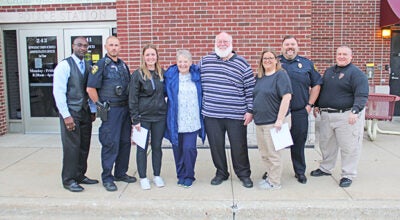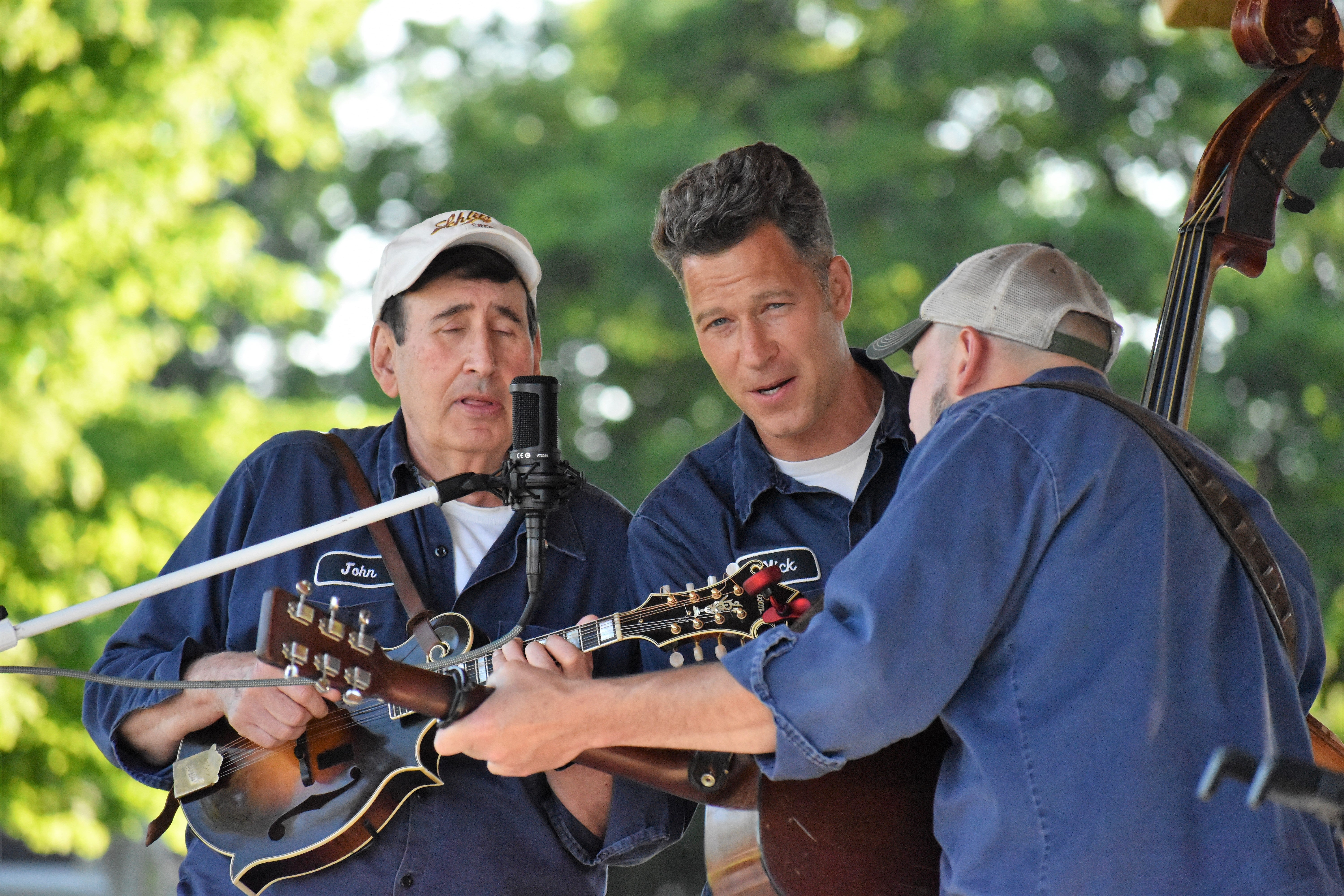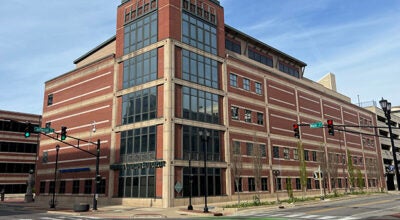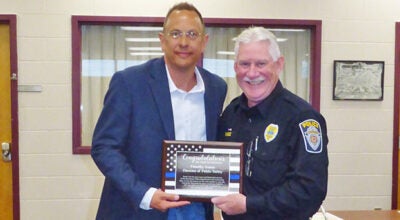New road manager documents data for continous improvement
Published 9:22 am Friday, October 16, 2009
By JOHN EBY
Dowagiac Daily News
CASSOPOLIS – At last year’s road summit, Louis Csokasy said if someone started in the corner of Cass County and spent money at current rates, it would take 66 years to rebuild the road system.
“Right now, with the effort we put forward this year with the townships, the road commission and the people working at the road commission, we’ve got that down to 38 years,” he informed the Board of Commissioners Thursday night. “Before everybody pops champagne, however, I’ll tell you that a road lasts 20 to 25 years, so we’re still losing ground, we’re just not losing it as fast.”
Csokasy is a stickler for continuous improvement, charting reams of data over time to measure whether performance is better or worse. One goal is to shave response time from a month to three weeks.
“A week ago last Tuesday we had a storm come through with 60 mph winds,” Csokasy related. “We responded to 39 calls before most people were up. We had all of the calls cleared that day.”
“There’s something else in this chart,” he said. “We say roads last 20 years, but because we spent a lot of money, a lot of effort and a lot of time talking about preventive maintenance, we’ve got a tick up. We spent our federal stimulus money on chip and seal, which nobody liked, including me. But we actually lengthened the life of our roads to a little over 21 years. We made a breakthrough in 2009. Yes, the stimulus helped us tremendously, but we chipped and sealed over 13 miles of road – a record – without it.”
In 2009, the road commission completed 32 miles of chip and seal, regraveled 5.68 miles in the Marcellus area and paved 21.92 miles of county roads.
“Gravel roads need to be upgraded. They wear out in about 10 years. That crunching sound is rocks being ground up and turning that rocky road into sand,” he said.
Two miles of Maple Road in Marcellus Township alone consumed 44,000 tons of gravel.
Csokasy, a former road commissioner who became manager last March, began, “We’ve tried to change our process at the road commission so all 53,000 people within the County of Cass are customers.”
So he wouldn’t turn his back to commissioners, he brought his wife, Donna, to operate the projector while he pivoted around in the center of the horseshoe-shaped commission, with Chairman Bob Wagel at the head of two rows of seven representatives.
There are 1,014 miles of roads in the county – 772 paved and 242 gravel.
Of 1,014 miles, 269 are primary roads and 745 county local – designations which affect funding formulas.
Cass County Road Commission either owns or is responsible for right-of-ways on 8,000 acres of land, which makes it one of the largest property users alongside major farm operations.
Cass County is one of only three with its own asphalt plants. It costs $75,000 a mile to asphalt a road.
“We’re all living under financially difficult times,” Csokasy said, adding, “This is not new for the Cass County Road Commission. Our major revenue source is the MTF (Michigan Transportation Fund). We get our money primarily from a tax on gasoline. Not on the dollar value of the gasoline, but on the gallon. This chart shows that number has gone down as our major funding source every year since 2003. It goes down around 2 percent a year. This year we forecast it would go down 2.5 percent. The Michigan Legislature projected it would go down 4.8 percent. Personally, I think I’m right and they’re wrong. We’ll see at the end of the year. It doesn’t look like much of a decrease until you realize the difference between 2003 and where we are today is about half a million dollars a year,” Csokasy said.
That $500,000 annually “would allow us to pave all of the primary roads” in all 15 townships; Pokagon Highway, from Cassopolis to Pokagon; or all of Calvin Center from U.S. 12 north to M-60.
Turning to cash reserves, Csokasy, of Penn Township, said, “Everybody says the road commission doesn’t have any money. That’s really not true. What we have is a decrease in cash reserves. The board set a reserve level of $750,000. Why is that important?
You’ve all heard about the Redfield bridge going down. If we have a bridge go down, we have to pay to get it back up. We need that reserve to take care of those emergencies. I might as well announce it now. We just received verbal communication today that we’re going to be allowed to open up the Redfield bridge, hopefully, within the next couple of weeks, which is a big deal for us. That’s good news.”
Csokasy said cash reserves decreased $94,000 in 2008-2009, or “not nearly as much as the year before.”
The road commission, in conjunction with townships, focused its resources to spend $2.5 million directly on roads.
“The townships play a tremendous role,” he said. “We should be thankful for the management of the townships because they have helped us and Cass County tremendously. We got about $476,000 in stimulus money. We spent every penny of our stimulus money on roads in Cass County.”
A three-year road plan process was reached with the townships.
“Basically, we’re trying to take data to the townships and work with them,” Csokasy explained. “It’s been accepted very well. A three-year plan makes you address an issue – not pass it on.”
One of those, in Silver Creek Township, will be the intersection of Indian Lake Road and Dixon Street.
Csokasy, noting revisions to medical policies for non-union staff, said, “None of these activities have been accomplished without some pain. We’ve worked really hard.”
He was accompanied by Chairman LeRoy Krempec of Mason Township and Road Commissioner Cliff Poehlman, a former chairman.
“The road commission staff has stepped up. We’ve actually reduced benefits. It’s recognition of the fact that our revenue base has gone down substantially. The way we feel now to partially offset the reduction in funding levels is to have good technology. You can’t have good technology without a good engineering department.”
The road commission also developed an “outside the white lines” plan for dealing with non-road issues, such as trees, brush and mowing.
“It doesn’t matter whether they send us any more money,” Csokasy said. “It doesn’t matter whether our budgets increase or decrease. Brush and trees in Cass County are not going to stop growing. We have to take care of it regardless of whatever else we do. That’s a big issue for us. Not a day goes by we don’t talk to some farmer about moving a combine down the road and he can’t get through there anymore because it’s hitting the side of his vehicle. That’s the good news. We’re starting to address it. The bad news – get ready for it – is we’re going to address it with a spray program. We’ll cut the brush mechanically, then spray it. I understand it’s a little controversial, but when you look at the economics, it’s the only thing to do.”
Csokasy said the spray program would probably start in Silver Creek Township.
“Management operation review” is another name for the continuous improvement philosophy.
“We are the maintenance department of Cass County,” he said. “We get over a thousand calls a year for service. It can be brush, mailbox repair, dead deer, signs, dust control, drainage is a big one, potholes, snow, you name it. Under miscellaneous, we get everything from taking boats out of the middle of the lake to resolving disputes between neighbors about which side of the fence their dog went to the bathroom on. We get ’em all.”
Csokasy is instilling the idea that complaints are not “problem calls,” but “service requests.”
The “suspicion” that the busiest time is winter during peak snow removal periods is “not true,” Csokasy said. “Our big months are June, July and August” because of storms.
The road commission now logs service requests by township, so when they get together for dialogue on the three-year plan, township officials “know what their citizens are complaining about. We can even break this information down by road – and we have.
“If we get a lot of complaints about a road, we’ll start analyzing who’s calling and why. You can see service requests in virtually every township is up. One thing we wanted to focus on was the amount of time it took to respond. If we haven’t responded in a month, I guess we’re not interested. That’s the message that goes out.
“We’ve done a tremendous amount of things within the commission that don’t cost a lot of money with the way we approach service requests. Since 2007-2008, we’ve tremendously reduced the amount of service calls over 30 days while increasing the number we respond to in under seven days. We’ve got some plain tough issues sitting out there” that might take a month to resolve. “The road commission has got the idea because they say, ‘In two years, we’ll be at two weeks’ ” turnaround.
“That’s right,” he agrees. “That’s continuous improvement. I’m here to tell the commissioners in this room and the citizens of Cass County that the road commission is working hard to satisfy and respond to citizen requests.”
Reopening the Redfield bridge was a 2010 goal. “We are very positive that that bridge is going to be selected for replacement,” Csokasy said. “Perhaps three years from now we’ll have a new bridge on Redfield. We want to negotiate new contracts with our unionized workforce, which comes up in June. We want to operate within the fiscal constraints of the funding. We watch cash on a daily basis with very tight controls. To this extent, the State of Michigan told us we probably do better than any other county they have. We want to complete a three-year road plan with each township and move response times down to a maximum of three weeks.”
Michigan State University Extension Director for Cass County Dan Rajzer, receiving a warm ovation upon returning from a health-related absence, responded to a suggestion by Commissioner Robert Ziliak, R-Niles, that his office might help the Road Commission with its roadside spraying program.
“We’d be more than glad to work with Louis and to help select pesticides that would be effective for road control while being environmentally safe,” Rajzer said.






